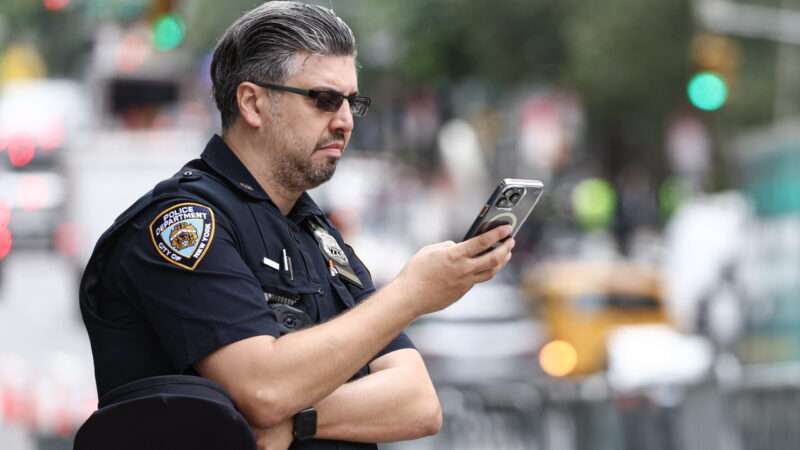
Growing police power has gravely distorted interactions between cops and citizens. Officers arrive with not just a gun and body armor but with wide-ranging legal immunities and both the privilege and training to lie to you during questioning.
Now they want to force you to unlock your phone.
The amount of personal data we keep on our smartphones is almost immeasurable, a reality the Supreme Court recognized in 2014 when it ruled that police must comply with the Fourth Amendment warrant requirement to search your device. But your phone has a simpler safeguard: a password that, under the Fifth Amendment, you shouldn't have to reveal unless the government overcomes your right against self-incrimination.
It's a right with deep roots, dating back to fourth-century Christian thinker St. John Chrysostom, who argued that no one should be required to confess their sins in public because it would discourage people from confessing at all.
By the 17th century, English common law had begun to develop these ideas into a right not to be interrogated under oath. The right achieved major recognition after the infamous Star Chamber sentenced prominent natural rights thinker John Lilburne to approximately 500 lashes for refusing to testify against himself. Lilburne remained a significant English philosopher and politician for decades while the Star Chamber was abolished just four years later.
Lilburne's case was so influential that colonial America enshrined the privilege against self-incrimination in nine state constitutions before it even became part of the Bill of Rights. Today, police act as if smartphones and digital technology invalidate those protections. They don't.
It doesn't matter if you haven't broken the law or you think you have nothing to hide. What matters is whether police believe—rightly or wrongly—that you have done something illegal or that you have something to hide. Police are incentivized not to protect rights but to arrest people allegedly (or actually) breaking laws.
Without a warrant and specific proof of incriminating evidence, police should never be allowed past your phone's lock screen.
Unfortunately, your Fourth Amendment right against warrantless searches and seizures is insufficient to stop police from scouring the trove of personal data on your phone for information unrelated to their investigation. Police can seize your device before they get a warrant and if they have the passcode nothing stops them from performing an off-the-record search—even if they might be later prevented from introducing that information in court.
Once police get warrants to perform specific searches—which courts regularly grant—they often retain smartphones far longer than needed to execute the narrow bounds of the warrant. They may try to introduce the evidence they "coincidentally" discovered, even if it falls outside the warrant's scope.
That gives police and prosecutors a lot of leverage. If they can't find what they need, they might still be able to pressure you into a false confession by threatening to charge you with something else—a practice known as coercive plea bargaining. With thousands of crimes on the books and years of life history on your phone, even the most law-abiding citizens could easily end up in hot water. This kind of pressure is why criminologists estimate that roughly two percent to eight percent of people who plead guilty every year are factually innocent.
But when police don't have your password, the dynamic changes. While law enforcement might eventually succeed in petitioning courts to make you unlock your device, you could thwart their petition by offering to provide your password to a trusted third party instead. This auditor would watch police searches to ensure they stay within a warrant's borders, preventing curious cops from reading the messy details of your last breakup and keeping your password out of police custody.
Unfortunately, the current state of Fifth Amendment case law is a mess. For one, a handful of courts have given police a loophole to your right against compelled testimony by reasoning that your password adds "little or nothing to the sum total of the Government's information" because police already know your password exists, just not what it is. This twisted reasoning ignores that police have no idea what's on your phone without the password.
And even some jurisdictions that eschew such silly reasoning may treat biometric passwords differently, ruling that police can make you unlock your phone via thumbprint or face scan because you aren't sharing "the contents of your mind." This has the strange result of providing more protection from unlawful searches to people who don't use modern unlock methods or who disable them by turning off their phones.
Congress must set a clear standard: Police should prove with specificity what's on your phone before forcing it open, and only after the device's owner has consulted with a lawyer. Doing so would provide citizens a means to ensure police follow warrant requirements without sacrificing law enforcement's ability to pursue the crime they're investigating. Your passcode and your right to keep it private exist for good reason, and Congress can restore much-need balance to the police-citizen relationship by preventing judicial chaos from eroding those boundaries.
The post Police Want the Password to Your Phone appeared first on Reason.com.







